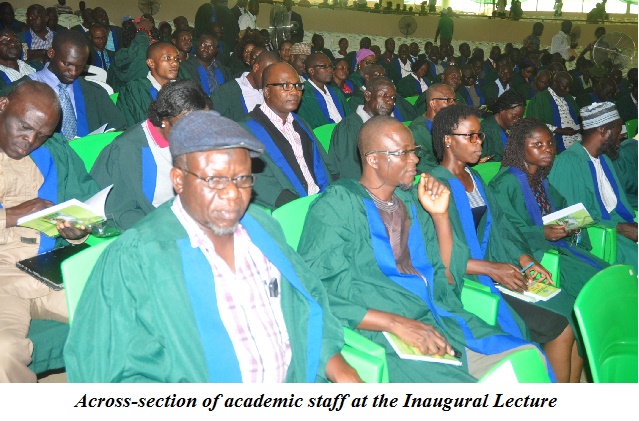Radical transformation of Nigeria’s food system has been proffered as solution to food insecurity and poverty eradication.

A Professor of Cropping System, Professor Kehinde Okeleye disclosed this while delivering the 54th Inaugural Lecture of the University, held at FUNAAB Ceremonial Building titled, “Food Security and Poverty Eradication Challenges in Nigeria: Agronomy to the Rescue”. Professor Okeleye called for thorough transformation of Nigeria’s food system through massive production of food crops and numerous value chains associated with each commodity, in order to achieve food security and poverty eradication.
The Inaugural Lecturer who was a former Director, Academic Planning Unit of the University, identified some constraints to adequate food production in Nigeria, stating that they include non availability of water, insufficient sunlight, soil as a factor in crop production, soil fertility management, instability of agricultural policies, among others. He observed that the recent policy on domestic rice production had been threatened by political interest, corruption, as well as abuse of fiscal incentives.Professor Okeleye noted that the intervention funds targeted at promoting agriculture with special low interest loans are being diverted by influential players while genuine farmers are left out.
According to him, mechanised farming which would reduce drudgery in farming was still elusive to most farmers, pointing out that lack of rural infrastructure like good roads, pipe-borne water, electricity, irrigation and other amenities to make farming in the villages attractive were still below expectation.
 On his contributions to knowledge, the Inaugural Lecturer disclosed that the areas included identification and finding solution to yield problems of some basic food crops like cassava, maize, cowpea and rice. According to him, cassava was compatible with most food and industrial crops in the cropping system in Nigeria and all ecozones in the sub-region.
On his contributions to knowledge, the Inaugural Lecturer disclosed that the areas included identification and finding solution to yield problems of some basic food crops like cassava, maize, cowpea and rice. According to him, cassava was compatible with most food and industrial crops in the cropping system in Nigeria and all ecozones in the sub-region.
He further added that through collaboration with International Institute of Tropical Agriculture (IITA) and National Agricultural Research Institutes (NARIS), they were able to evaluate many varieties of cowpea for adaptability to different environment, grain yield, yield stability and productivity in the humid South West, Nigeria.
The Lecturer, who is of the Department of Plant Physiology and Crop Production (PP & CP), College of Plant Science and Crop Production (COLPLANT) also identified four major cropping systems to include Alley cropping, Intercropping, Mono-cropping and the Taungya, noting that the Taungya is when food crop is grown within the spaces between tree crops.
 Professor Okeleye gave a number of far-reaching recommendations that could assist in the country’s drive for food security and poverty eradication. These include increase in productivity by encouraging mechanised farming, saying that farmers should be encouraged to group themselves into production cooperatives, in order to pool their resources together for mechanisation with the help of extension workers.
Professor Okeleye gave a number of far-reaching recommendations that could assist in the country’s drive for food security and poverty eradication. These include increase in productivity by encouraging mechanised farming, saying that farmers should be encouraged to group themselves into production cooperatives, in order to pool their resources together for mechanisation with the help of extension workers.
He also called on Government to fund Research and Development which would spur key innovations, while rural infrastructures should be seriously improved so that young farmers would be attracted to farm, to remain and practice farming.
He called for funding of extension units like Agricultural Media Resources and Extension Centre (AMREC), saying that they should be funded directly by Federal Government so that research output can get to the farmers easily, adding that they should be upgraged to the status of institutes.
Professor Okeleye also requested that subsidised credit facilities should be provided for agricultural business and large scale farming.
Speaking at the occasion, the Vice-Chancellor, Professor Kolawole Salako, disclosed that the Inaugural Lecture was the second to be delivered from the Department of Plant Physiology and Crop Production, the 10th from the College of Plant Science and Crop Production (COLPLANT) and the first that he was presiding over as Chairman since his assumption of office as the Sixth Substantive Vice-Chancellor of the University.
The occasion was well attended by dignitaries from all walks of life. They include the Olowu of Owu Kingdom, Oba Adegboyega Dosumu represented by the Akogun of Owu Kingdom, Chief Raubil Akinsipo; Chief Medical Director (CMD), Federal Medical Centre (FMC), Abeokuta, Professor Adewale Musa; former Deputy Vice Chancellor and pioneer Dean, COLPLANT, Professor Timothy Tayo; the pioneer University Librarian, Dr Taofiq Salisu and members of staff of Crescent University, led by the Vice-Chancellor, Professor Ibrahim Gbajabiamila.
 Making a presentation to the Inaugural Lecturer on behalf of the Proprietor of Crescent University, The Vice-Chancellor, Prince Bola Ajibola, Professor Gbajabiamila appreciated Professor Okeleye for a job well done during his tenure as the Vice-Chancellor of Crescent University, disclosing that upon assumption of office, only two programmes were accredited in the University but by the time he was leaving 17 programmes had been accredited.
Making a presentation to the Inaugural Lecturer on behalf of the Proprietor of Crescent University, The Vice-Chancellor, Prince Bola Ajibola, Professor Gbajabiamila appreciated Professor Okeleye for a job well done during his tenure as the Vice-Chancellor of Crescent University, disclosing that upon assumption of office, only two programmes were accredited in the University but by the time he was leaving 17 programmes had been accredited.
